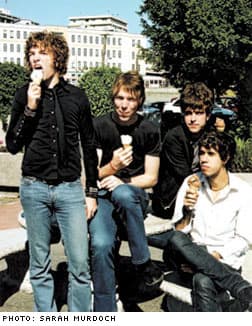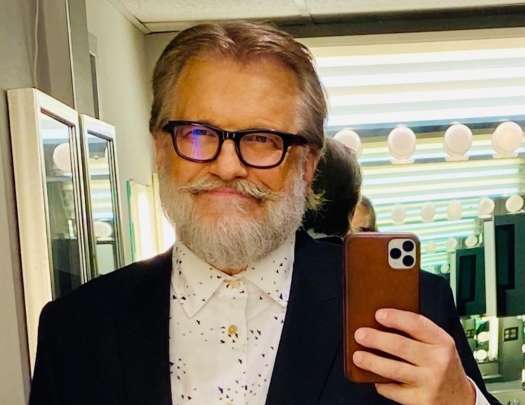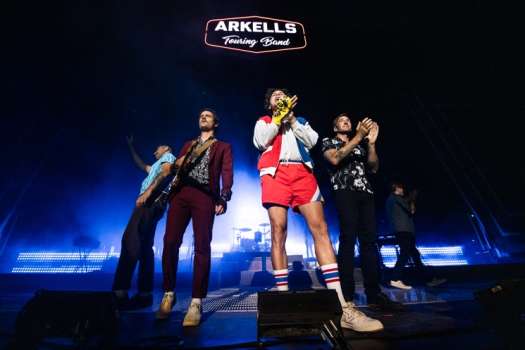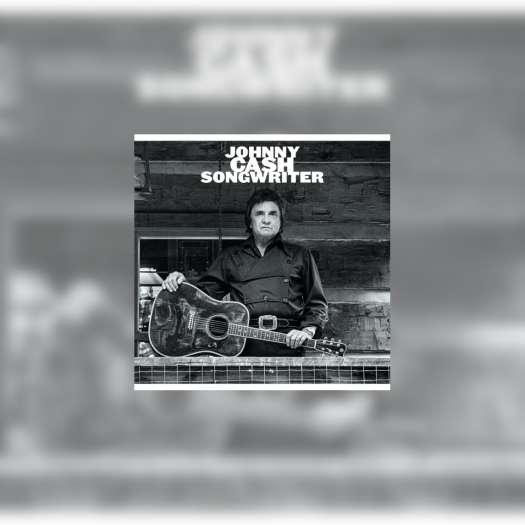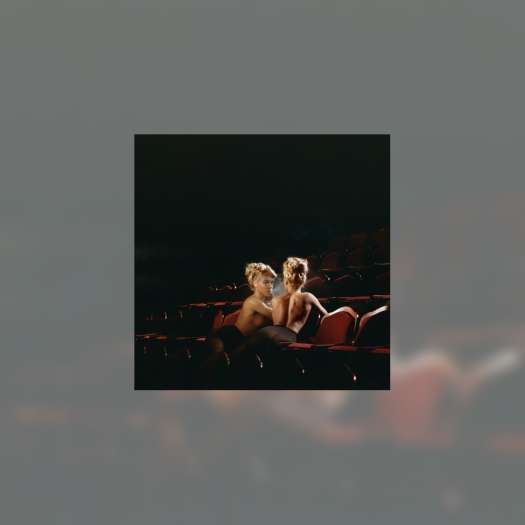Victoria musician Paul Hawley has only been on the phone for 20 seconds and already there's trouble at the Hot Hot Heat house. A klaxon wails in the background.
"Oh, no," says the 21-year-old drummer, his descending, lamenting tone suggesting the occurrence of some regular malaise. "They set off the smoke alarm." The culprits are Hawley's flatmates Steve Bays, Dustin Hawthorne and Dante DeCaro. Together, the four fuming roomies also comprise Hot Hot Heat the, uh, hottest Victoria, BC punkish-rock prospect to connect with mainland North America since NoMeansNo. Outside of sharing the same hometown, though, the common ground between the two units accounts for a paltry parcel. For starters, there's that whole age thing: despite the band's convincing new wave inflections, the entire Hot Hot Heat crew is of comparable vintage to fellow Vancouver Islander Nelly Furtado (indeed, either Wright brother could stand in convincingly as a paternal unit to any of the young combo's constituents). And whereas NoMeansNo has long toiled in the sometimes subterranean recesses of the international punk underground, Hot Hot Heat has come alight at a time when many mainstream taste makers are warming up to a more artful, classically-reverent brand of gritty, melodic rock'n'roll.
Given that criteria, Hot Hot Heat's chances of achieving something more than a mere modicum of success at least in the conventional music industry sense (read: cha-ching!) appear downright favourable. Area codes aside, Hot Hot Heat does share at least one other commonality with NoMeansNo: the support of a West Coast American indie label. While the latter initially got its message out to the world via Jello Biafra's Alternative Tentacles, though, the former enjoys the backing of the once mighty (though still influential) Sub Pop imprint. In April, the Seattle-based label issued a five song EP, Knock Knock Knock and this month's cross-Canada tour dates will serve as a further introduction to prospective fans beyond the continent's western coast. As if to underscore the label's commitment to the band, Hot Hot Heat was invited to perform at Sub Pop's recent 14th anniversary party on a bill with critically-revered New Mexico label-mates the Shins and legendary Seattle rock relics Mudhoney. Clearly, the folks at Sub Pop consider Hot Hot Heat capable of living up to its moniker. Hawley (currently maintaining a patient sort of radio silence until the smoke alarm desists) likes his band's chances, too. As far as he's concerned, Sub Pop is the right place for Hot Hot Heat, and the right time is now.
"The way that the music scene is going now," he says, the offending device finally having been quieted, "now that there's a bit less influence of electronic [music] and DJing and hip-hop, I think there's kind of a cool window for rock to come back and for songwriters to get a bit of the spotlight again. I think Sub Pop is recognising that and that's why you've got bands like the Shins, who are just an awesome pop band, and rock bands like the Black Halos."
Once upon a time Sub Pop maintained a veritable stable of cool bands from Canada, too groups like Newfoundland's Hardship Post, enigmatic Moncton rockers Eric's Trip, Calgary punks Chixdiggit and Halifax quartet Jale, to name a few. Closer to Hawley's home, Vancouver melodic-pop masters Zumpano enjoyed a pair of Sub Pop releases in the mid-90s. Ultimately, however, the label's Canuck contingent was whittled down to shavings after a major-label buy-in that seemed to precipitate an effective moratorium on high-risk, low-return recording artists. Recently, Sub Pop appears to be making somewhat of a returning to its pioneering risk-taking and development-oriented roots. That the label has largely come back around to doing what it does best isn't lost on Hot Hot Heat vocalist and keyboard player Steve Bays, who now joins the conversation on another extension.
"People talk about the ups and downs of Sub Pop, or any label that has its ups and downs," says Bays, 24, "but I think it's like any business where you have people coming and going. Part of it is because of the way the music industry is going, and part of it is the A&R people have changed over time. The guy we work with used to work at DreamWorks and Geffen, and then he actually quit and applied at Sub Pop because he wanted to work more on an indie level and be tighter with the bands, and that really shows in his personality. He's a lot like a lot of the people working at Sub Pop now. They're all just super stoked to be working there."
One constant around the Sub Pop camp has been Seattle producer Jack Endino. Though never a full-fledged staffer, Endino has recorded and mixed dozens of titles for Sub Pop, including Nirvana's platinum-selling debut album Bleach (which, according to legend, cost all of $600 to make), and discs by Soundgarden and Mudhoney among many, many others. In May, Endino travelled to Vancouver and set up shop in that city's venerable Mushroom Studio to record material for Hot Hot Heat's full-length debut. The disc was mastered back in Seattle with the help of Death Cab For Cutie guitarist Chris Walla, who recorded and co-produced three of the tracks on Knock Knock Knock. In a recent entry in his online diary, Endino describes the forthcoming CD as "a hell of a record and very different from what people usually expect of me."
Intriguing though Endino's comments may be, folks will have to wait a while to decide whether or not they concur: Sub Pop isn't scheduled to release the disc until early October.
Hot Hot Heat's brief history began three years ago at a casual jam session between friends dissatisfied with their lots in the Victoria music scene. Hawley had been playing guitar in the Detroit Death Watch a unit whose sound he describes as "synthy, 80s keyboard rock." Bays and Hawthorne, meanwhile, were bandmates in emo-pop combo Missiles To Heaven, in which they played drums and guitar, respectively. Fronted by founding vocalist Matthew Marnik, Hot Hot Heat put in its inaugural live performance in the summer of 1999 at a Victoria all-ages event called Surftoberfest.
"There were all these surf bands playing and we got randomly thrown on the bill," recalls Hawley with a laugh. "I think the kids were a little freaked by it, cause it was pretty fresh at the time.
"It was like keyboard kinda mathy rock," he continues. "There was less emphasis on melody and more emphasis on just crazy energy and being loud and being technical rather than writing songs and trying to put on a good show. Right now, we look at the band way more holistically. Back then we were sort of doing it on auto-pilot, just kinda cruising along."
Despite the lack of direction, though, Hot Hot Heat's first couple of years together were well documented with home studio recordings and well represented with a series of vinyl releases. A self-titled, four-song seven-inch was first out of the gates on Vancouver's Ache Records, followed by a similarly eponymous three-song effort issued in Germany on the Monotonstudio label. Next came a split twelve-inch with Vancouver combo Red Light Sting (also released by Ache) to which Hot Hot Heat contributed another five tracks. In February 2001, all of that early material was compiled, augmented with a demo recording and released on CD by Florida label Ohev Records as Scenes One Through Thirteen. Though largely devoid of the catchy pop hooks and vocal melodies of Hot Hot Heat's current incarnation, the material stands on its own impressive legs just the same.
"We're not necessarily totally stoked on it, but at the same time we're not embarrassed by it either," Hawley says of the band's disparate back catalogue. "It's kind of like if you look back at pictures of yourself when you were 13 or something. That's just who you were then and it kinda shaped who you are now."
"If I'm embarrassed about anything it's the recording quality," adds Bays. "We were still at that stage in our lives where we didn't think anyone outside of our friends were going to hear it. If we knew that it was going to get to the point where people were actually playing it and listening to it, then I think we would have probably done more than just used a four-track. If I remember correctly we had jammed seven times when we recorded some of that stuff. Some of it was recorded prior to even playing our first show."
By the time Scenes One Through Thirteen was released, Hot Hot Heat's metamorphosis was already underway. Citing irreconcilable musical differences, the group parted ways with Marnik and moved the mic stand over to the keyboard console where Bays assumed the additional role of principal vocalist. Next, the formerly guitarless band drafted DeCaro for six-string duty, affording Bays more room in the arrangements to flex his mouth muscles. Hawthorne and Hawley maintained their respective rhythmic roles on bass and drums. "We just wanted to get more melodic and more musical," recalls Hawley. "If the band was going to go on, we had to be able to hear what we were thinking. We had all these expectations about what we should be rather than just being who we were. That's when we got a little more serious about it. Right now, I feel like the band and the songs are exactly who we are."
Upon hearing Hot Hot Heat's Knock Knock Knock EP, even listeners with the most fleeting familiarity with the Cure are almost inevitably moved to draw a coarse line of comparison between Bays' vocals and those of that Brit band's front-man Robert Smith. Clearly, Bays has given that particular charge of likeness some serious thought.
"I think maybe it's just the combination of being kind of whiny but with really catchy vocal melodies projected in kind of a punk way." Bingo.
Another comparison the band routinely gets tagged with is XTC. Bays has that one sussed, too, explaining DeCaro is somewhat of a disciple of the veteran Swindon, UK pop outfit.
"Dante basically grew up on XTC," says Bays, "so I can see that in the guitar playing. I don't know what sort of style you would call it, but he's constantly moving his hand, which is kind of an XTC thing. He can't really just hold a chord and chill out on it."
Irish rockers U2 complete the triumvirate of most common Hot Hot Heat parallels. "Bono really likes to project his voice really loud and he's always kind of fighting to be in the foreground," opines Bays, "so I think people have made the comparison based on that." Hawley says that while picking up on stylistic commonalties with other bands may be a fun exercise, Hot Hot Heat's most profound influence comes from the bucolic, often sleepy Pacific Rim city the band calls home.
"I think [being from Victoria] has had a huge impact on us," he says. "We wouldn't be nearly what we are if it wasn't for where we're from."
"There are a bunch of ways that it's affected us," agrees Bays. "One is that there haven't really been any mentors or role models in Victoria for us to follow. Also, in terms of style, there were never any bands here that were doing what we're doing, so there wasn't a sense of competition."
"But by the same token, there wasn't a sense of camaraderie, either," adds Hawley. "We don't feel like we're from some sort of exploding scene. We're just kind of here alone more or less."
Hawley says the band has discussed relocating across the Straight of Georgia to Vancouver a veritable rite of passage for most young, creative Vancouver Islanders. However, until such time as a move is absolutely warranted, Hot Hot Heat is determined to stay put.
"We've talked about it, but if we're going to go on tour for months at a time, we might as well come back to Victoria rather than relocate to a city that's way nastier," says Hawley, adding the band already ferries across to the mainland two or three times each month. "I like Vancouver, but Victoria is like a security blanket. It's so cosy here, which is part of the reason why it's so stifling, but also part of the reason why it's so nice."
According to Bays' estimation, Hot Hot Heat is entitled to take a degree of pride in its Victorian distinction. He says the fact that the city barely registers on the music industry's radar means the band has accomplished its achievements strictly on its own merit.
"In other cities, if you're in a band the way to move ahead in the music scene is through social means, getting to know the right people and making the right connections and stuff," he says. "With us, because there wasn't a huge music scene in Victoria, the only way to get noticed outside of Victoria was through the music being good, basically. Whereas some bands can move ahead by just meeting the right people and by getting the right shows and the right promotion and the right recording studio and stuff, the only way for us to get people to notice us was by the music standing out."
Don't Quit Your Day Job
Paul Hawley, 21, Drummer
"I work at a cell phone store. It's kind of boring, but it's insanely flexible. I can go away on tour for weeks and then come back and still have a job, so it's nice like that."
Steve Bays, 24, Vocalist/Keyboardist
"I was working at the [CHUM] TV station as an editor for a while but I had to quit that because I just didn't have enough time. I was doing some freelance work as a video editor as well. The only thing I've been doing since then is working at the University [of Victoria] doing audio work and graphic design and web site design. I'm one semester away from graduating with my sociology degree, but I think we're going to be on tour so I'm not going to be able to go back to school in the fall."
Dustin Hawthorne, 25, Bassist
"I actually just quit my job. I was working at a drug store. Counter work, basically, working at the customer service desk."
Dante DeCaro, 21, Guitarist
(In the words of Steve Bays): "He was going to Camosun College taking some general arts courses history, English, psychology, sociology. Other than that he's just been working construction with his dad. They, like, work on restaurants and houses and stuff like that. Right now he's living off what's left of his student loan.
"Oh, no," says the 21-year-old drummer, his descending, lamenting tone suggesting the occurrence of some regular malaise. "They set off the smoke alarm." The culprits are Hawley's flatmates Steve Bays, Dustin Hawthorne and Dante DeCaro. Together, the four fuming roomies also comprise Hot Hot Heat the, uh, hottest Victoria, BC punkish-rock prospect to connect with mainland North America since NoMeansNo. Outside of sharing the same hometown, though, the common ground between the two units accounts for a paltry parcel. For starters, there's that whole age thing: despite the band's convincing new wave inflections, the entire Hot Hot Heat crew is of comparable vintage to fellow Vancouver Islander Nelly Furtado (indeed, either Wright brother could stand in convincingly as a paternal unit to any of the young combo's constituents). And whereas NoMeansNo has long toiled in the sometimes subterranean recesses of the international punk underground, Hot Hot Heat has come alight at a time when many mainstream taste makers are warming up to a more artful, classically-reverent brand of gritty, melodic rock'n'roll.
Given that criteria, Hot Hot Heat's chances of achieving something more than a mere modicum of success at least in the conventional music industry sense (read: cha-ching!) appear downright favourable. Area codes aside, Hot Hot Heat does share at least one other commonality with NoMeansNo: the support of a West Coast American indie label. While the latter initially got its message out to the world via Jello Biafra's Alternative Tentacles, though, the former enjoys the backing of the once mighty (though still influential) Sub Pop imprint. In April, the Seattle-based label issued a five song EP, Knock Knock Knock and this month's cross-Canada tour dates will serve as a further introduction to prospective fans beyond the continent's western coast. As if to underscore the label's commitment to the band, Hot Hot Heat was invited to perform at Sub Pop's recent 14th anniversary party on a bill with critically-revered New Mexico label-mates the Shins and legendary Seattle rock relics Mudhoney. Clearly, the folks at Sub Pop consider Hot Hot Heat capable of living up to its moniker. Hawley (currently maintaining a patient sort of radio silence until the smoke alarm desists) likes his band's chances, too. As far as he's concerned, Sub Pop is the right place for Hot Hot Heat, and the right time is now.
"The way that the music scene is going now," he says, the offending device finally having been quieted, "now that there's a bit less influence of electronic [music] and DJing and hip-hop, I think there's kind of a cool window for rock to come back and for songwriters to get a bit of the spotlight again. I think Sub Pop is recognising that and that's why you've got bands like the Shins, who are just an awesome pop band, and rock bands like the Black Halos."
Once upon a time Sub Pop maintained a veritable stable of cool bands from Canada, too groups like Newfoundland's Hardship Post, enigmatic Moncton rockers Eric's Trip, Calgary punks Chixdiggit and Halifax quartet Jale, to name a few. Closer to Hawley's home, Vancouver melodic-pop masters Zumpano enjoyed a pair of Sub Pop releases in the mid-90s. Ultimately, however, the label's Canuck contingent was whittled down to shavings after a major-label buy-in that seemed to precipitate an effective moratorium on high-risk, low-return recording artists. Recently, Sub Pop appears to be making somewhat of a returning to its pioneering risk-taking and development-oriented roots. That the label has largely come back around to doing what it does best isn't lost on Hot Hot Heat vocalist and keyboard player Steve Bays, who now joins the conversation on another extension.
"People talk about the ups and downs of Sub Pop, or any label that has its ups and downs," says Bays, 24, "but I think it's like any business where you have people coming and going. Part of it is because of the way the music industry is going, and part of it is the A&R people have changed over time. The guy we work with used to work at DreamWorks and Geffen, and then he actually quit and applied at Sub Pop because he wanted to work more on an indie level and be tighter with the bands, and that really shows in his personality. He's a lot like a lot of the people working at Sub Pop now. They're all just super stoked to be working there."
One constant around the Sub Pop camp has been Seattle producer Jack Endino. Though never a full-fledged staffer, Endino has recorded and mixed dozens of titles for Sub Pop, including Nirvana's platinum-selling debut album Bleach (which, according to legend, cost all of $600 to make), and discs by Soundgarden and Mudhoney among many, many others. In May, Endino travelled to Vancouver and set up shop in that city's venerable Mushroom Studio to record material for Hot Hot Heat's full-length debut. The disc was mastered back in Seattle with the help of Death Cab For Cutie guitarist Chris Walla, who recorded and co-produced three of the tracks on Knock Knock Knock. In a recent entry in his online diary, Endino describes the forthcoming CD as "a hell of a record and very different from what people usually expect of me."
Intriguing though Endino's comments may be, folks will have to wait a while to decide whether or not they concur: Sub Pop isn't scheduled to release the disc until early October.
Hot Hot Heat's brief history began three years ago at a casual jam session between friends dissatisfied with their lots in the Victoria music scene. Hawley had been playing guitar in the Detroit Death Watch a unit whose sound he describes as "synthy, 80s keyboard rock." Bays and Hawthorne, meanwhile, were bandmates in emo-pop combo Missiles To Heaven, in which they played drums and guitar, respectively. Fronted by founding vocalist Matthew Marnik, Hot Hot Heat put in its inaugural live performance in the summer of 1999 at a Victoria all-ages event called Surftoberfest.
"There were all these surf bands playing and we got randomly thrown on the bill," recalls Hawley with a laugh. "I think the kids were a little freaked by it, cause it was pretty fresh at the time.
"It was like keyboard kinda mathy rock," he continues. "There was less emphasis on melody and more emphasis on just crazy energy and being loud and being technical rather than writing songs and trying to put on a good show. Right now, we look at the band way more holistically. Back then we were sort of doing it on auto-pilot, just kinda cruising along."
Despite the lack of direction, though, Hot Hot Heat's first couple of years together were well documented with home studio recordings and well represented with a series of vinyl releases. A self-titled, four-song seven-inch was first out of the gates on Vancouver's Ache Records, followed by a similarly eponymous three-song effort issued in Germany on the Monotonstudio label. Next came a split twelve-inch with Vancouver combo Red Light Sting (also released by Ache) to which Hot Hot Heat contributed another five tracks. In February 2001, all of that early material was compiled, augmented with a demo recording and released on CD by Florida label Ohev Records as Scenes One Through Thirteen. Though largely devoid of the catchy pop hooks and vocal melodies of Hot Hot Heat's current incarnation, the material stands on its own impressive legs just the same.
"We're not necessarily totally stoked on it, but at the same time we're not embarrassed by it either," Hawley says of the band's disparate back catalogue. "It's kind of like if you look back at pictures of yourself when you were 13 or something. That's just who you were then and it kinda shaped who you are now."
"If I'm embarrassed about anything it's the recording quality," adds Bays. "We were still at that stage in our lives where we didn't think anyone outside of our friends were going to hear it. If we knew that it was going to get to the point where people were actually playing it and listening to it, then I think we would have probably done more than just used a four-track. If I remember correctly we had jammed seven times when we recorded some of that stuff. Some of it was recorded prior to even playing our first show."
By the time Scenes One Through Thirteen was released, Hot Hot Heat's metamorphosis was already underway. Citing irreconcilable musical differences, the group parted ways with Marnik and moved the mic stand over to the keyboard console where Bays assumed the additional role of principal vocalist. Next, the formerly guitarless band drafted DeCaro for six-string duty, affording Bays more room in the arrangements to flex his mouth muscles. Hawthorne and Hawley maintained their respective rhythmic roles on bass and drums. "We just wanted to get more melodic and more musical," recalls Hawley. "If the band was going to go on, we had to be able to hear what we were thinking. We had all these expectations about what we should be rather than just being who we were. That's when we got a little more serious about it. Right now, I feel like the band and the songs are exactly who we are."
Upon hearing Hot Hot Heat's Knock Knock Knock EP, even listeners with the most fleeting familiarity with the Cure are almost inevitably moved to draw a coarse line of comparison between Bays' vocals and those of that Brit band's front-man Robert Smith. Clearly, Bays has given that particular charge of likeness some serious thought.
"I think maybe it's just the combination of being kind of whiny but with really catchy vocal melodies projected in kind of a punk way." Bingo.
Another comparison the band routinely gets tagged with is XTC. Bays has that one sussed, too, explaining DeCaro is somewhat of a disciple of the veteran Swindon, UK pop outfit.
"Dante basically grew up on XTC," says Bays, "so I can see that in the guitar playing. I don't know what sort of style you would call it, but he's constantly moving his hand, which is kind of an XTC thing. He can't really just hold a chord and chill out on it."
Irish rockers U2 complete the triumvirate of most common Hot Hot Heat parallels. "Bono really likes to project his voice really loud and he's always kind of fighting to be in the foreground," opines Bays, "so I think people have made the comparison based on that." Hawley says that while picking up on stylistic commonalties with other bands may be a fun exercise, Hot Hot Heat's most profound influence comes from the bucolic, often sleepy Pacific Rim city the band calls home.
"I think [being from Victoria] has had a huge impact on us," he says. "We wouldn't be nearly what we are if it wasn't for where we're from."
"There are a bunch of ways that it's affected us," agrees Bays. "One is that there haven't really been any mentors or role models in Victoria for us to follow. Also, in terms of style, there were never any bands here that were doing what we're doing, so there wasn't a sense of competition."
"But by the same token, there wasn't a sense of camaraderie, either," adds Hawley. "We don't feel like we're from some sort of exploding scene. We're just kind of here alone more or less."
Hawley says the band has discussed relocating across the Straight of Georgia to Vancouver a veritable rite of passage for most young, creative Vancouver Islanders. However, until such time as a move is absolutely warranted, Hot Hot Heat is determined to stay put.
"We've talked about it, but if we're going to go on tour for months at a time, we might as well come back to Victoria rather than relocate to a city that's way nastier," says Hawley, adding the band already ferries across to the mainland two or three times each month. "I like Vancouver, but Victoria is like a security blanket. It's so cosy here, which is part of the reason why it's so stifling, but also part of the reason why it's so nice."
According to Bays' estimation, Hot Hot Heat is entitled to take a degree of pride in its Victorian distinction. He says the fact that the city barely registers on the music industry's radar means the band has accomplished its achievements strictly on its own merit.
"In other cities, if you're in a band the way to move ahead in the music scene is through social means, getting to know the right people and making the right connections and stuff," he says. "With us, because there wasn't a huge music scene in Victoria, the only way to get noticed outside of Victoria was through the music being good, basically. Whereas some bands can move ahead by just meeting the right people and by getting the right shows and the right promotion and the right recording studio and stuff, the only way for us to get people to notice us was by the music standing out."
Don't Quit Your Day Job
Paul Hawley, 21, Drummer
"I work at a cell phone store. It's kind of boring, but it's insanely flexible. I can go away on tour for weeks and then come back and still have a job, so it's nice like that."
Steve Bays, 24, Vocalist/Keyboardist
"I was working at the [CHUM] TV station as an editor for a while but I had to quit that because I just didn't have enough time. I was doing some freelance work as a video editor as well. The only thing I've been doing since then is working at the University [of Victoria] doing audio work and graphic design and web site design. I'm one semester away from graduating with my sociology degree, but I think we're going to be on tour so I'm not going to be able to go back to school in the fall."
Dustin Hawthorne, 25, Bassist
"I actually just quit my job. I was working at a drug store. Counter work, basically, working at the customer service desk."
Dante DeCaro, 21, Guitarist
(In the words of Steve Bays): "He was going to Camosun College taking some general arts courses history, English, psychology, sociology. Other than that he's just been working construction with his dad. They, like, work on restaurants and houses and stuff like that. Right now he's living off what's left of his student loan.
